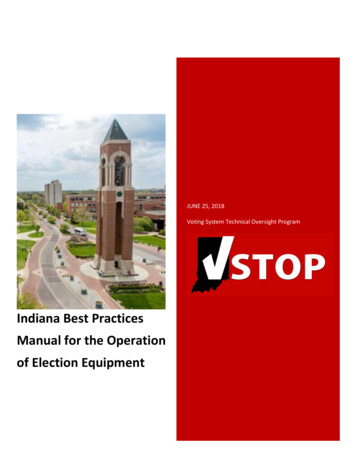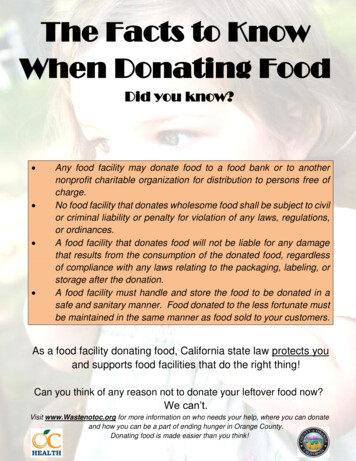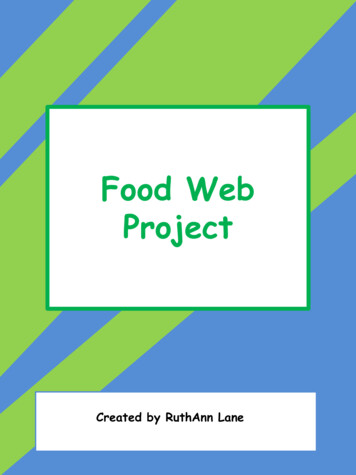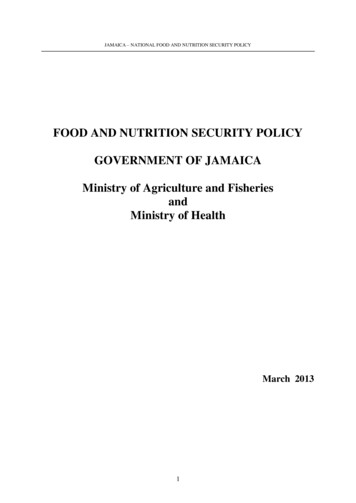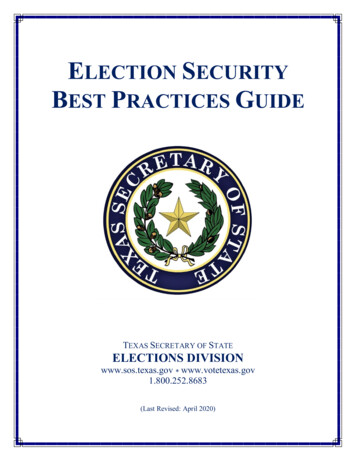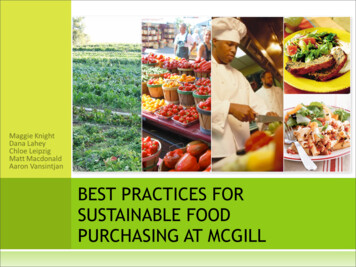
Transcription
BEST PRACTICES FORSUSTAINABLE FOODPURCHASING AT MCGILL
PROBLEM STATEMENT Concern over ecological impacts,economic stability, social conditions ofagriculture Sustainability standards requiresustainability information McGill has the potential toinstitutionalize sustainable foodpurchasing practices, but the existingsystem lacks the resources to develop asustainable system alone.
PROBLEM ANALYSIS ATMCGILLIndicatorAnalysisDrivingForcesSeparation of campus food from farms(spatial and through supply chain)Industry focus on price, Busy actors,PressuresLack of product information other thanprice, difficulty of defining foodsustainability for McGill’s contextStateUninformed decision makers (staff andstudents)ImpactDifficulty of measuring or improvingimpact of food sourcing
QUESTION How can information flowfrom farm to plate? Who can coordinate thisprocess?How can McGillinstitutionalize sustainablefood purchasing?
CONSIDERINGSTAKEHOLDERS Students (diners, residence councils, student clubsand initiatives) Administrators & Staff Mathieu Laperle (Director, Food and HospitalityServices) Bill Pageau (Contracts Administrator, Food and DiningServices) Oliver de Volpi (Executive Chef) Dennis Fortune (Sustainability Director, Office ofSustainability) Culinary team and serving staffProducers and Suppliers, Community partners
CASE STUDIES In order not to reinvent the wheel, wecompleted case studies of four peeruniversitiesUC BerkeleyYaleUMassAmherstU of Toronto
SELECTED CASE STUDIES Forager Model (UMass Amherst, Yale) University creates staff position responsiblefor sustainable purchasing (research,sourcing, menu planning, sustainabilitypolicy) Yale: Single grant-funded position UMass Amherst: Several specialized staffmembers to enable informed decisionmaking
SELECTED CASE STUDIES Outsourcing Model (UC Berkeley, U of T) External organization is responsible forsustainable purchasing (research, sourcing,information flow to university purchasers andmenu planners, sustainability definitions) UC Berkeley: Community Alliance with FamilyFarmers (CAFF) relays information to executivechefs via Chuck Davies (Associate Director forResidential Dining) U of T: Local Food Plus (LFP) relaysinformation to unit managers of each eatingfacility
SELECTED CASE STUDIES:Forager Model(UMass el(UC Berkeley,U of T)Control oversustainability definitionsSmaller time and capitalinvestmentMaintains a relationshipbetween Dining Servicesand farmersLarge time and capitalinvestment to obtaingrants or create asalaried positionGain expertise andknowledge of exteriororganizationLoss of capacity tocreate or modifyexisting sustainabilitydefinitionsDegree of separationbetween Dining Servicesand farmers
MANAGEMENT PLAN:COMMUNITY CONNECTIONS Hire a McGill Food Sustainability Coordinator Coordinate local food research and purchasing Coordinate reporting, stakeholder engagement,and information flowPartner with Exterior Organization Provide link to local producers Assist in defining regional food sustainabilitycriteriaDistribution?Benefits of Partnership McGill gains expert knowledge and capacity Equiterre gains testing ground for programexpansion and research capacity of studentprojects Connection of various system components
MANAGEMENT PLAN:COMMUNITY CONNECTIONS Suggested McGill Food SustainabilityCoordinator Responsibilities Facilitate the flow and storage of informationbetween stakeholdersFacilitate growth of partnerships with Equiterre andcorporate food providersCoordinate and incorporate student research projectsOrganize an annual community forum (suggested inFebruary)Compile an annual report (suggested in August),including measuring and reporting on indicatorsWrite funding proposals and grant applicationsIdentify cost savings opportunities for local sourcingPerform administrative tasks
MANAGEMENT PLAN:COMMUNITY CONNECTIONS Partnership with Exterior Organization Assists in defining regional food sustainabilitycriteria Provides knowledge of local producers andtheir products Develops relationships with farms that meetsustainability criteria Provides the connection between sustainableproducers and McGill Food Services, supplyingan inventory of available products and theability to access them
TIMELINE
TIMELINE: NEXT STEPS November – December 2009 January – February 2010 Develop job description, hiring process and criteria,and governance/oversight structure for FSCSubmit funding proposal for FSC salary (May 2010April 2011) and related costs to the SustainabilityProjects FundMarch 2010 Begin development of funding proposal for FoodSustainability Coordinator (FSC)Facilitate project recommendations throughimplementation of a multistakeholder groupReceive funding confirmationApril 2010 Hiring process for Food Sustainability Coordinator
TIMELINE: YEAR ONE(MAY 2010 – APRIL 2011) May – August 2010 September 2010 Submit funding proposals for Year TwoFebruary 2011 Launch pilot project in self-operated residences incollaboration with Equiterre and a distributor likeHector Larivée or CanAmOctober 2010 FSC collaborates with Equiterre and multistakeholdercommittee to agree upon sustainability definitions,develops pilot project for self operated cafeteriasReview pilot projectMarch 2011 Renew FSC contract or begin hiring process
TIMELINE: YEAR TWO(MAY 2011 – APRIL 2012) May - August 2011 September 2010 Implement corporate food services pilot project andself-operated cafeterias expansionOctober 2010 evaluate second half of Year OneComplete annual report for the period of May 2010May 2011Develop corporate food services pilot project andexpansion model for self-operated cafeterias forimplementation in September 2011Submit funding proposals for Year ThreeFebruary 2011 Host campus wide forum regarding pilot project andfuture of food sustainability at McGill
TIMELINE
EXPECTED RESULTS Benefits for McGill and Equiterre McGill gains capacity to coordinate localsourcing Creates student applied research opportunitiesfor undergraduates at McGill Equiterre gains testing ground for localdistribution network Equiterre gains program capacity and access toadditional grant funding opportunities McGill and Equiterre create a strong, flexiblesystem which neither could accomplish alone
EXPECTED RESULTS (2) Strengthening Locally and GloballyDiners on campus gain understand the impact of theirfood choices and its connection the local communityCarbon footprint of McGill’s food system is reduced McGill and Equiterre create an innovative modelwhich can be used by other institutions in theregion McGill and Equiterre help to increaseregional capacity of local producers andsuppliers
INDICATORS OF SUCCESS(1) Creating the System Criteria: Have clear definitions for "local,""organic," and "sustainable" food been agreedupon? Communication & Distribution: Has a systembeen created that relays information betweenMcGill purchasers and local producers andfacilitates distribution? Capacity & Partnership: Has FSC position beencreated? Has a partnership with an externalorganization been established? Is thepartnership sustainably funded?
INDICATORS OF SUCCESS(2) Establishing clear goals: sustainable purchasing guidelines for freshproduce and non-processed foodpercentage targets for local purchasingare these guidelines and targets being used byself-operated and sub-contracted residences? Example: Have percentage targets for producemeeting Equiterre-McGill sustainabilitystandards been achieved (20% by April 2013,35% by April 2014, 50% by April 2015)?
NEXT STEPS Agreeing on a plan Developing relationship with outsideorganization Determine Food Sustainability Coordinatorjob description, hiring process and criteria,and governance/oversight structure(December-January) Submit funding application to SustainabilityProjects Fund (January)
DISCUSSION Do we like the vision? Is this specific plan achievable? Does anything need to be revised? Do we have all the importantstakeholders and decision-makers onboard?
purchasing practices, but the existing system lacks the resources to develop a sustainable system alone. PROBLEM ANALYSIS AT MCGILL Indicator Analysis Driving Forces Separation of campus food from farms (spatial and through supply chain) Industry focus on price, Busy actors, Pressures Lack of product information other than price, di"culty of defining food sustainability for McGill's context .







